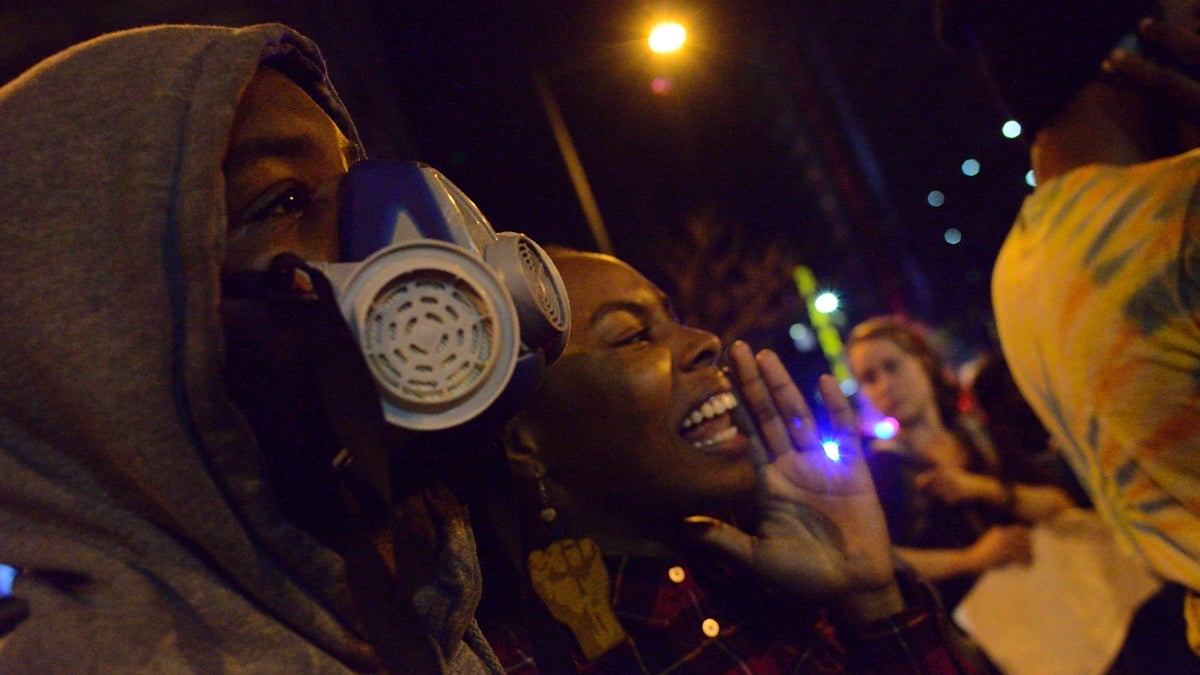The Ferguson grand-jury decision is a call to action

Protestors took to the streets of Philadelphia after the grand-jury decision was announced on Monday night. (Bas Slabbers/for NewsWorks)
St. Louis County Prosecutor Robert McCulloch announced Monday night that Ferguson (Mo.) Police Officer Darren Wilson has not been indicted in the shooting death of unarmed teenager Michael Brown.
With that, the long and agonizing wait that began shortly after the clock struck noon on Aug. 9 ended.
That afternoon, the lives of Darren Wilson and Michael Brown were forever locked together in the struggle between race and class, between crime and punishment, between right and wrong.
On that summer afternoon, when Officer Wilson confronted Brown, who’d been accused of stealing a box of cigars from a local store, Wilson took on the role of judge, jury and executioner.
Just 61 seconds after he happened upon the young man, Brown’s bullet-riddled body lay dead in the street. It would remain there for four and a half hours.
Conflicting reactions
There are those who say Brown earned his fate through his own actions. They say he should never have stolen cigars. They say he should never have walked in the street.
They say that Officer Wilson’s version of events — where Brown supposedly rushed at the officer and left him fearing for his life — justifies Wilson’s actions.
But there are also those who say otherwise.
Witnesses refuted Wilson’s account, saying Michael Brown had his hands up in a gesture of surrender when Wilson shot him dead.
But McCulloch, in his statement, said that witness accounts were belied by physical evidence, and that the grand jury’s job was to “separate fact from fiction.”
A movement has arisen around what those witnesses say they saw, and it remains to be seen if there will be federal civil-rights charges filed against Wilson related to the death of Michael Brown.
A life was taken
That’s not the point right now. The point is that Brown, who received the death penalty on Canfield Street in Ferguson, Mo., at the hands of Darren Wilson, will never graduate from the college he planned to attend. He will never marry or have children. He will never have a career.
Yet Wilson will live. He will get to love his new wife. Perhaps he will even father children. And if he does, he will never have to live in fear that those children will be gunned down by police.
He will never have to worry that their lives will be extinguished like flames.
He will never have to believe that the justice system will fail them, because those children will not be black men.
At the heart of the protests
The protests in Ferguson and across the country were never just about Michael Brown.
They were about Amadou Diallo, and Trayvon Martin, and Jordan Davis, and Akai Gurley, and the endless list of black men who have died in similar fashion.
They were about the long line of mothers who have buried their sons, the scores of fathers who have wept over caskets.
The protests were about all of us, and they still are.
That’s why we were outraged to see peaceful protesters met with tanks, to see legitimate grievances met with cynicism, and to see demands for justice met with hatred.
What now?
But still, we will go on, just as we always have.
We will survive this ruling, just as we’ve survived all the others.
Yes, there will be protests and prayer vigils.
Yes, there will be anger and tears, but through it all, our demands will remain the same.
We demand to have for our children what Darren Wilson will have for his own: The right to walk free without fear of being gunned down by police; the right to know the justice system won’t fail them; the right to simply exist.
Until every Michael Brown has each of those rights, we must continue to protest.
We must continue to demand.
We must not rest.
Michael Brown’s memory is worth that much.
WHYY is your source for fact-based, in-depth journalism and information. As a nonprofit organization, we rely on financial support from readers like you. Please give today.


